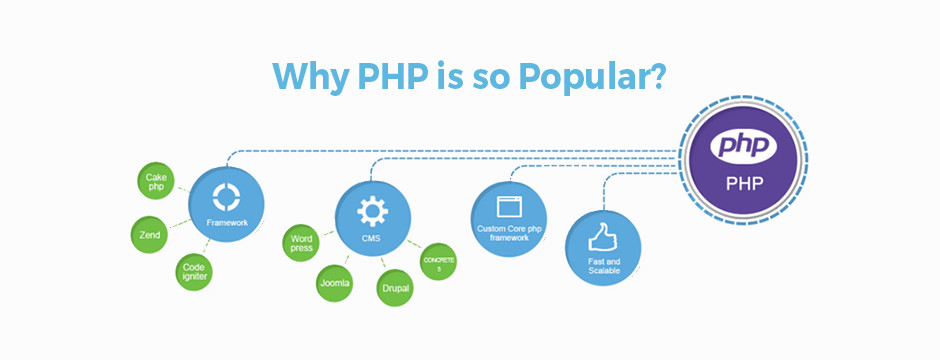PHP (Hypertext Preprocessor) is a powerful scripting language that has been driving the web since its inception in 1994. Initially designed for creating dynamic web pages, PHP has evolved into a versatile language powering a significant portion of the internet. In this article, we delve into 20 vital statistics that underscore the importance of PHP in the digital landscape.
- Market Share and Usage:
- PHP remains one of the most popular server-side scripting languages, with over 79% of all websites using it for dynamic content generation. (W3Techs)
- WordPress, the world’s most popular content management system (CMS), is built on PHP, powering approximately 40% of all websites on the internet. (W3Techs)
- Scalability and Performance:
- PHP has demonstrated remarkable scalability, with platforms like Facebook, Wikipedia, and Tumblr utilizing it to handle massive amounts of traffic efficiently.
- PHP 7.x versions have shown significant performance improvements, with up to 2x faster performance and 50% better memory consumption compared to PHP 5.x versions.
- Robust Frameworks:
- Frameworks like Laravel, Symfony, and CodeIgniter have contributed to PHP’s modernization, offering developers robust tools and libraries for building complex web applications rapidly.
- Job Opportunities:
- PHP developers continue to be in high demand, with thousands of job openings worldwide. Companies ranging from startups to tech giants seek PHP expertise for web development projects.
- Community Support:
- PHP boasts a vibrant and active community of developers worldwide, offering extensive documentation, tutorials, and forums for support and collaboration.
- Cross-Platform Compatibility:
- PHP is platform-independent, running seamlessly on various operating systems such as Linux, Windows, macOS, and Unix.
- Ease of Learning:
- PHP’s syntax is straightforward and easy to grasp, making it an ideal choice for beginners entering the world of web development.
- Versatility:
- PHP is not limited to web development; it can also be used for command-line scripting, desktop applications, and even building IoT (Internet of Things) projects.
- Open Source Nature:
- PHP is an open-source language, meaning it’s free to use and constantly evolving thanks to contributions from a vast community of developers worldwide.
- Security Measures:
- PHP has evolved its security features over the years, with regular updates and patches addressing vulnerabilities and ensuring a secure development environment.
- Content Management Systems (CMS):
- Besides WordPress, PHP powers other popular CMS platforms like Joomla, Drupal, and Magento, providing flexibility and customization options for website owners.
- E-commerce Dominance:
- PHP-based e-commerce solutions like WooCommerce (WordPress plugin) and Magento are preferred choices for businesses seeking robust and scalable online storefronts.
- Database Integration:
- PHP seamlessly integrates with various database systems, including MySQL, PostgreSQL, SQLite, and MongoDB, facilitating dynamic content management and data-driven applications.
- API Development:
- PHP’s versatility extends to API (Application Programming Interface) development, enabling developers to create RESTful APIs for seamless interaction between different software systems.
- Continuous Evolution:
- The PHP development community is actively working on improving the language, with regular updates and releases introducing new features, enhancements, and optimizations.
- Legacy Support:
- Despite the emergence of newer technologies, PHP continues to maintain backward compatibility, ensuring that legacy applications remain functional without major code modifications.
- Cloud Compatibility:
- PHP applications can be easily deployed and scaled in cloud environments, leveraging platforms like AWS (Amazon Web Services), Google Cloud Platform, and Microsoft Azure.
- High-Profile Projects:
- Many high-profile projects and websites rely on PHP, including Slack, Wikipedia, MailChimp, and Etsy, highlighting its capability to handle diverse use cases.
- Resource Efficiency:
- PHP’s lightweight nature and efficient memory management contribute to its ability to handle large volumes of requests without putting excessive strain on server resources.
- Future Prospects:
- With ongoing advancements in web development and the continuous evolution of PHP, the language is poised to remain a dominant force in powering the digital landscape for years to come.
Conclusion: PHP stands as a cornerstone of modern web development, offering unparalleled versatility, performance, and community support. As evidenced by the statistics highlighted in this article, PHP’s importance in shaping the digital ecosystem cannot be overstated, making it a vital skillset for developers and a preferred choice for businesses seeking robust and scalable web solutions.
